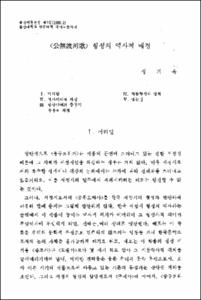사회복지제도 및 삻의 질을 위한 기초 여건
- Alternative Title
- Social Welfare System and the Basic Conditions for Quality of Life: A Comparative Study from a Perspective of Distributive Justice
- Abstract
- 본 논문에서는 한국의 사회복지제도가 추구하는 이념과 삶의 질을 보장하기 위한 기초여건의 실태를 분석한다. 논문의 전반부에서는 사회복지제도에 대한 자유주의적 이론, 공리주의적 이론, 사회민주주의 및 마르크스주의, 그리고 형평이론을 간략히 소개한다. 이어 서구 선진국들간의 비교를 통하여 각 국가가 추구하는 이념을 비교한다. 국가간 비교를 위하여 사회민주주의를 표방하고 있는 스웨덴과 노르웨이, 보수적 입장의 독일과 오스트리아, 급진적인 입장의 호주와 뉴질랜드, 그리고 자유주의적 이념을 추구하는 캐나다와 미국을 주요 비교의 대상으로 선정하였다. 그 외에도 한국의 복지실태를 조망할 수 있는 준거의 틀로서 아시아 국가인 일본, 홍콩, 및 싱가포르를 포함시켰다. 마지막으로 위의 국가들과 한국의 국가에 대한 국민들의 기여, 경제여건 및 고용의 안정성, 건강 및 사회보장, 교육, 사회적 스트레스 및 안전, 인간발달지수 및 환경조건 등을 비교함으로써 한국의 삶의 질을 위한 기초여건의 형평성을 고찰하였다.
This study analyzes Korea's welfare system and its basic conditions for securing quality of life. The first part of the study briefly reviews various theories on social welfare: liberal theory, utilitarian theory, social democratic theory and the Marxist theory, and equity theory. The second part compares the ideals and goals that the 8 chosen European nations pursue with their own welfare systems. The nations employed in the comparison are Sweden and Norway with a social democratic ideal, Germany and Austria with a conservative ideal, Australia and New Zealand with a radical ideal, and Canada and the U.S. with a liberal ideal. In addition to the 8 nations, 3 Asian nations, Japan, Hong Kong, and Singapore, are included for a more direct and comprehensive comparison with Korea. The last part analyzes the degree of fairness of exchange between people and the government by comparing such indices as financial and labor contributions to the government, economic condition and employment, health and social insurance programs, education, social stress and safety, human development indices and environment of Korea with those of the chosen countries.
This study analyzes Korea's welfare system and its basic conditions for securing quality of life. The first part of the study briefly reviews various theories on social welfare: liberal theory, utilitarian theory, social democratic theory and the Marxist theory, and equity theory. The second part compares the ideals and goals that the 8 chosen European nations pursue with their own welfare systems. The nations employed in the comparison are Sweden and Norway with a social democratic ideal, Germany and Austria with a conservative ideal, Australia and New Zealand with a radical ideal, and Canada and the U.S. with a liberal ideal. In addition to the 8 nations, 3 Asian nations, Japan, Hong Kong, and Singapore, are included for a more direct and comprehensive comparison with Korea. The last part analyzes the degree of fairness of exchange between people and the government by comparing such indices as financial and labor contributions to the government, economic condition and employment, health and social insurance programs, education, social stress and safety, human development indices and environment of Korea with those of the chosen countries.
- Issued Date
- 2000
- Type
- Research Laboratory
- Alternative Author(s)
- Lee,Eun Woo; Jun,Sung Pyo; Lee,Jae Ki
- Publisher
- 사회과학논집
- Language
- kor
- Rights
- 울산대학교 저작물은 저작권에 의해 보호받습니다.
- Citation Volume
- 10
- Citation Number
- 2
- Citation Start Page
- 97
- Citation End Page
- 128
- Appears in Collections:
- Research Laboratory > Journal of social science
- 파일 목록
-
-
Download
 000002023884.pdf
기타 데이터 / 2.15 MB / Adobe PDF
000002023884.pdf
기타 데이터 / 2.15 MB / Adobe PDF
-
Items in Repository are protected by copyright, with all rights reserved, unless otherwise indicated.